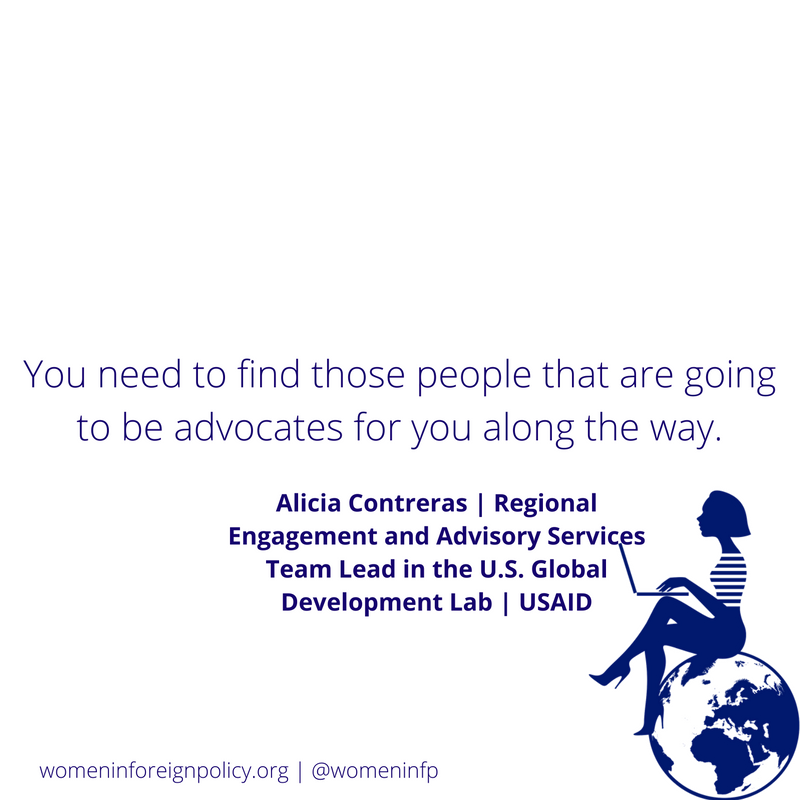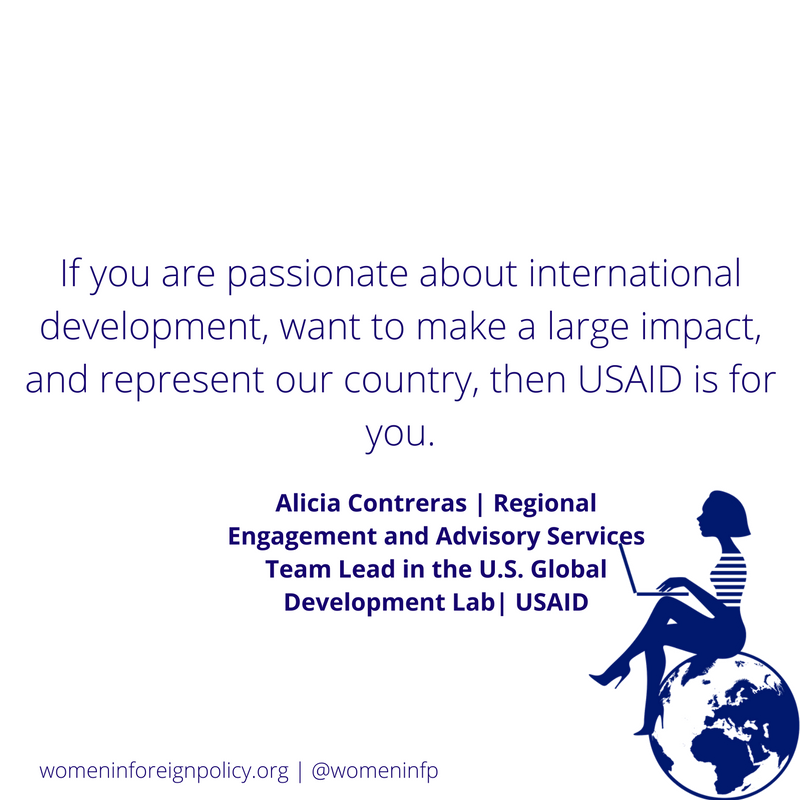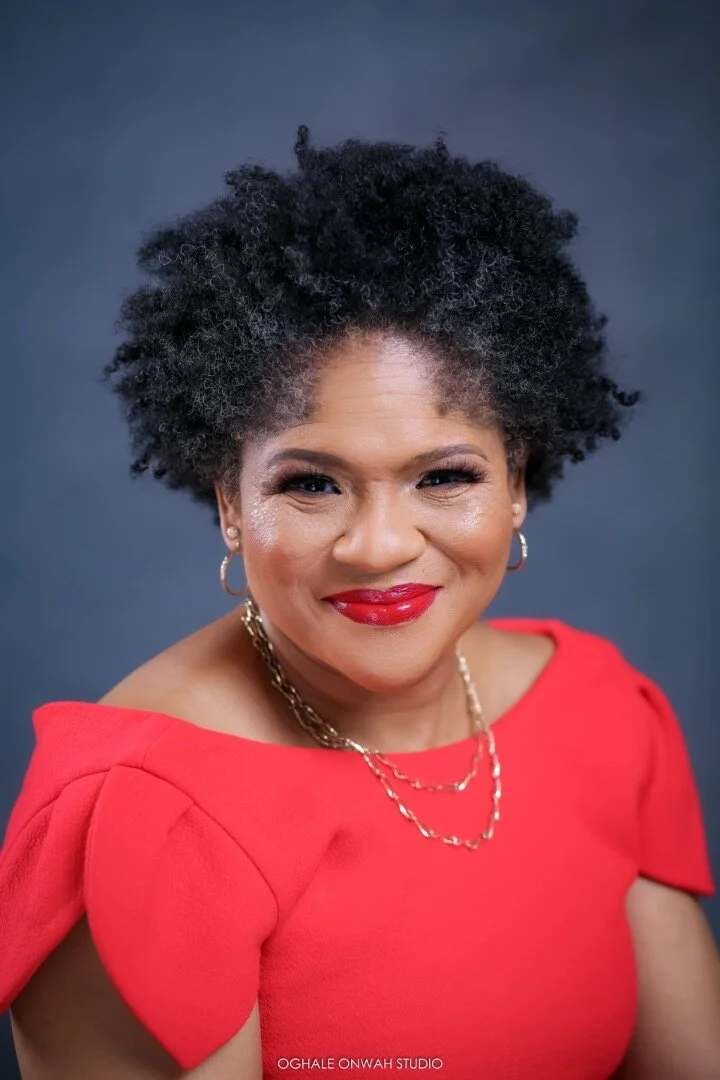Alicia Contreras
/Regional Engagement and Advisory Services Team Lead in the U.S. Global Development Lab | USAID
CV in brief:
Education: Western Illinois University
Find Alicia online: LinkedIn
Exclusive interview by Lucie Goulet, December 2016
What do you do for USAID?
I'm a Foreign Service Officer and I've been with the agency for over 8 years now. I work overseas on international aid programs. Specifically, I was hired to work as a Private Enterprise Development Officer. Currently, I'm doing a domestic tour in the US Global Development Lab, the newest bureau for the agency. It has only been around for a little over 2 and a half years. We work with our field Missions and Washington, D.C operating unites to integrate science, technology, innovation, and partnerships across all of our strategies, programs, and activities.
You previously worked for Liberty Mutual Insurance.
I got the job right out of University. I worked for Liberty Mutual Insurance as a case manager. Then I decided that I wanted to go back to school to get an MBA. After that, I applied to USAID out of pure luck and became a Foreign Service Officer.
What was the application process like?
It was a difficult process. Out of pure luck, I met another Latina Foreign Service Officer from the Foreign Agricultural Service. She told me about USAID, since I had never heard of it. I had to google it. All I knew about was the State Department Foreign Service, and thought it sounded cool. I wanted to go overseas and do good things.
I applied to USAID online, like most people do for government jobs. Then I just assumed everything went into a black hole because it took about five months before I heard back from them. When I did hear back from them they said, "We need you here next week for an interview."
I went to DC to do my interview and it was a day-long process. Candidates don't take a test like they do in the State Department because we have a minimum education requirement of a Masters degree because we manage tax-payer dollars.
I'm not sure what the intake process is right now, but I believe it's pretty similar to what I had to do. First, you are given about nine minutes to complete a case study. Then you do a panel interview with the other people that are interviewing at the same time. You present this case study, as a team oral presentation to the interviewing panel. After that, you do an individual panel interview. It's just you by yourself with the interview panel and everyone asks you questions.
That took pretty much a full day and again, I didn't hear back from them for a few months. Then I got a conditional offer saying, "We'd like to conditionally offer you this job however, you have to pass your medical clearance and your security clearance." After everything was said and done, it took about 11 months before I actually started at USAID in the third officer class.
What's a medical clearance?
When you apply to be a Foreign Service Officer, you have to be able to go pretty much anywhere in the world. If you have health issues, you're restricted in where you can go. If you are not able to leave the States, then you may not be able to be a Foreign Service Officer.
What would your advice be to someone who's thinking of applying for USAID?
I would say be patient. USAID has a lot of applications to process. My understanding is that for one open position there are hundreds of applicants, so it's very competitive. Don't be dismayed and disheartened if you don't hear back from them immediately. It’s just a long process.
I would say if you are passionate about international development, want to make a large impact, and represent our country, then USAID is for you.
Do you think your experience of USAID, and career in general has been different being a Latina woman?
Absolutely because the Latin culture is very family oriented. We're very much a strong-knit, family-oriented community. The general stereotype of a Latina specifically is that you don't leave your home until you get married. It wouldn’t usually be at the top of the list for a Latina to leave her family and not be married to travel the world.
That's definitely changing. More and more Latinas are getting a higher education, especially advanced degrees. When I went to grad school, back in 2006, Latinos enrolled in Master’s programs represented approximately four percent. There weren't a lot of us getting a graduate education, let alone thinking about leaving the country, our families and living by ourselves overseas. That was just not something that was very popular.
I grew up in a really bad neighborhood. The fact that I didn't become a statistic, that I didn't get pregnant, that I didn't get involved in drugs, and that I didn't become part of a gang was miraculous. I'm one of those few that can say, "We're lucky that we got out of that and were able to really make something of ourselves."
My parents were immigrants and they didn't have much of an education themselves. The fact that I even graduated from high school was quite an accomplishment. I owe all my success to my hard-working immigrant parents.
Would you have any advice based on your life experience for a Latina girl going through something similar?
I would say, "Don't be afraid and sky's the limit." I didn't even know that this type of work existed. I wouldn't have learned that if I had gotten stuck in my hometown and not tried to make something better of myself. I get really emotional talking about this because I still work with young women and I mentor young women because this is very important to me. I think sometimes we get afraid and don’t purse our dreams.
So I'd say, "Go for it and if you really want something, you're going to find a way.” You need to find those people that are going to be advocates for you along the way. I had some great mentors and some great sponsors who said, "You know what? Alicia can do this." I guess I never gave up, even though my parents did not understand what my life trajectory was.
My father asked, "Why are you going to college?" He was so against it because he was so traditional. He said, "No, you don't need to go to college. You graduated from high school, go get a job and get married and support your husband." I just couldn't believe it. I was so hurt by it. I told him, "I'm going to have to disobey you because I know that the only way to get ahead in this country and the reason why you came here, is to make a better life for us and I know education is the way to get ahead.”
I went off to college and I found those people who supported me, supported my career aspirations. When I came to Washington DC to do an internship for my Master's degree, I saw other Latinas that inspired me. When they told me about the Foreign Service and pushed me to apply for USAID, I got excited. I already knew I wanted to do something outside of Illinois but if it wasn't for another Latina woman to make me feel comfortable to say, "I'm going to do this," I might not have done it.
Now that you've been in the Foreign Service for a while, do you think there's steps that could be taken to encourage more Latinas to take part at an institutional level?
Definitely. I think the onus is on us as individuals to make that a priority. Lately I've been working a lot on diversity and inclusion within the agency. I'm part of the Agency’s “Diversity and Inclusion in Development Program” where we discuss these issues. We work on and discuss increasing diversity and inclusion at the agency and among leadership.
I'm also a part of the Hispanic Employee Affinity Group, and I mentor diverse women, specifically speaking to them about careers in the Foreign Service. I'm also the president of the Lambda Theta Alpha Latin Sorority, Inc. Alumnae Chapter here in DC and talk to my sorority sisters about international work. I use every avenue that I can at work and in my spare time to advocate for young Latinas to look at job opportunities in Foreign Affairs as a possible career and life trajectory for themselves. That's the first challenge, to bring this type of career to their attention.
Many girls growing up don't have many resources. They don't even know that this type of career exists. If I could put a nickel in a jar for all the times I hear that from all the young ladies that I speak to, I would be rich. When they hear about it, I get a thousand questions. I had a great opportunity last week to speak to a large cadre of interns from the Congressional Hispanic Caucus Institute - CHCI.
It's a group of students, both male and female, that are brought to DC as interns to explore public policy and leadership. I spoke on a panel last week to them. They were amazed. There were two Latinas in the Foreign Service on this panel, including myself, and we got the most questions. "How did you find it? Who told you about this? What do I need to study to become a foreign service officer? What do I need to do? This sounds great, where would I work? How do I get trained?" They're excited about it. They wanted to learn more.
There’s one other thing that I have to mention, it's not just convincing the students, they're convinced immediately. Once you put this opportunity out there, they're excited. We need to work with the parents and convince the parents and their family that this is a worthwhile career. I say that more for first generation Latinos like myself. To this day, I'm not sure if my parents completely understand what I do, but they support me. I think that's half the battle with some of these younger professionals and students, convincing parents and their families to be supportive. It isn’t always easy.
Is there anything else that you want to add?
It's important that we focus on these types of careers and initiatives for women and diverse groups. It’s definitely important for women because I feel that sometimes we get the short end of the stick. We’re really trying at USAID to make sure that we’re inclusive of all peoples in everything that we do. I appreciate their endeavors to reinforce this diversity and inclusivity at all levels not just throughout leadership but throughout all working levels.
I've had many amazing opportunities at USAID. They recently sponsored me to attend a leadership training, the International Career Advancement Program through the Aspen Institute. I think that just reinforces their faith in their staff and me as a woman, a Latina, and care about my professional development and those of my colleagues.
Latinas make up a small group of Foreign Service – there are only a handful of Latinas out there. If there's anything, anything at all that I can do to motivate other young women in general, I'm more than happy to do that. That's why I spend a lot of my time volunteering and presenting to many groups and advocating for careers in foreign affairs especially at USAID.
To see the bright smiles on our beneficiaries faces, makes my day. That is the most satisfying part of my job! That's one thing that I miss about being in the field that I don't get to see every day in DC, I miss the people. Interacting with the people we assist through our programs makes this career worth doing.




